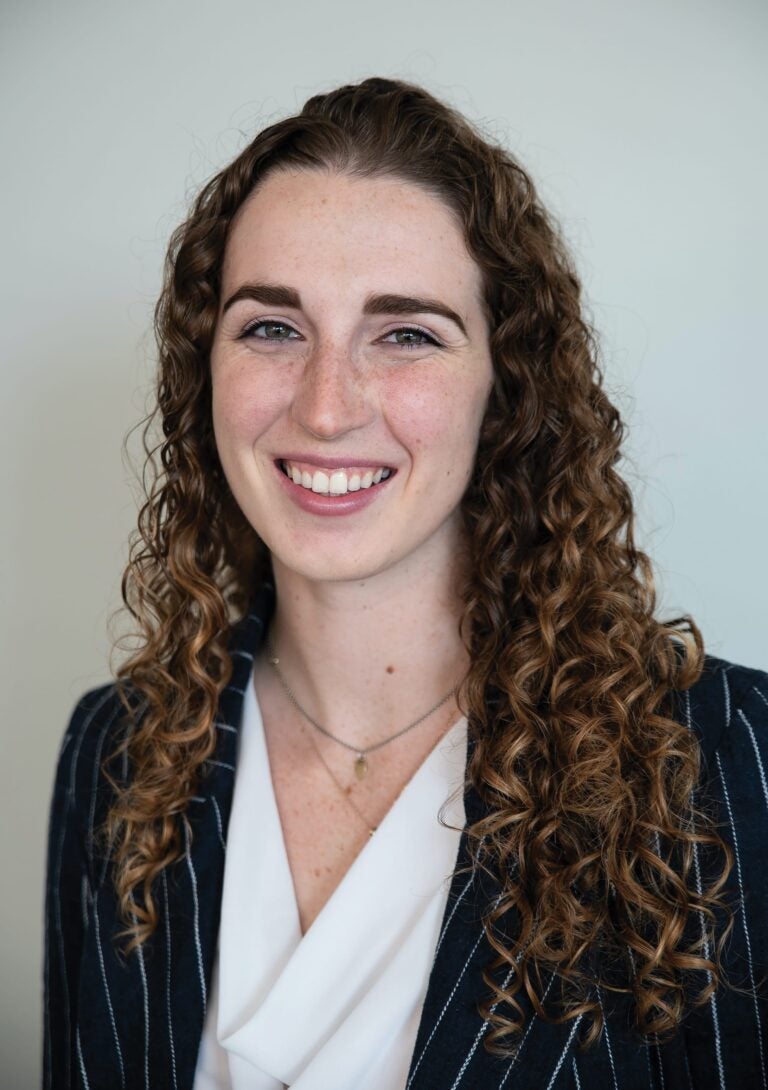A McCOMBS MBA is a Top Choice for Dell Med’s Future Doctors
Story by Sharon Jayson | Photo by Melissa Glynn
After graduating from Texas McCombs, Jon Trujillo, BBA ’16, became a data analyst at Goldman Sachs in Salt Lake City. Two years into his career, he realized, “I didn’t love my work.” What he loved was science.
Trujillo had been taking science courses at the University of Utah, which inspired him to quit his job in 2018 and became a full-time student.
“My thought was to marry my business education and my new-found passion for science,” he says. “I thought maybe becoming a doctor could be this perfect job.”
Now in his third year at Dell Medical School at The University of Texas at Austin, Trujillo, who grew up in the San Antonio area, is among those who next year will earn an M.D. from Dell Med and an MBA from McCombs. Third-year students at Dell Med can work on a clinical innovation or entrepreneurial project, conduct in-depth research, or pursue a dual degree. Since the medical school opened nearly a decade ago and graduated its first class four years later, by far the most popular option for Dell Med students has been the McCombs MBA.
Of the 335 Dell Med students graduating between 2020 and 2026, more than a quarter (87), have chosen the McCombs MBA from among a dozen offerings. The No. 2 selection has been the Master of Public Health, which 60 students chose to study at the UT Health Science Center in Houston.

Leaders at McCombs and Dell Med attribute the MBA program’s success to a fast-changing U.S. health care landscape in which business knowledge has become increasingly important. Traditionally, hospitals and health care organizations have been run by administrators with business backgrounds.
“Our medical students see the impact of business decisions being made in health care all the time,” says Tina Mabley, McCombs’ senior assistant dean for the full-time MBA program. “Whether it’s financial management, optimization of patient care, or tech innovations in health care systems and products, they recognize they’re impacted by those business decisions and want more of a hand in decision-making.”
Internist Beth Nelson, senior associate dean of undergraduate medical education at Dell Med, helped develop the school’s innovative four-year curriculum that condenses two years of traditional classes into one and carves out the third year for personal growth and exploration. Medical students seeking a second degree can earn both in four years rather than five.
“When Dell Med started, one of its mission statements was to develop leaders who would transform health care,” Nelson says. “In doing so, we believe strongly that we want to provide additional skills beyond clinical medicine to our students.
“We have a spectrum of ways students can gain additional skills to think creatively and innovatively and approach problems in a different way.”
Trujillo says no other option outweighed the benefits of pairing his BBA with a medical degree and an MBA. “Medical school teaches us how to practice medicine, but it’s more than just the patient/doctor interaction,” he says. “And that’s where the MBA has been the most beneficial. It’s about making decisions about which procedures to offer in a clinic versus what’s easier to send out. What’s cheaper for the patient? We have more ways to analyze situations.”
Trujillo enrolled at Dell Med in June 2022 at age 28, along with fellow student Justin Jensen, also pursuing an MBA. Both are nontraditional med students because they’re older than the norm and had previous careers.
“I had zero desire and/or know-how to attend college, period, or medical school,” says Jensen, 39. “No one in my family had ever graduated college. I had no path forward to go into higher education.”
A Los Angeles native, Jensen graduated from high school and worked in construction and real estate. At age 23, he joined the Army, became a Green Beret, and served with the 7th and 19th Special Forces Groups in Florida and Texas. That included deployments to Afghanistan, Belize, Brazil, Guatemala, and Honduras. During eight months in Afghanistan, in 2013, he learned to treat combat-related trauma patients.
“I had some pretty unique medical experiences,” says Jensen. “That lit the fire and passion for me to pursue medicine. That experience alone was the sole driver for me leaving the military and pursuing higher education.”
He enrolled at Baylor University, studied molecular biology and biochemistry, and earned a Bachelor of Science degree in 2021.
“As a physician, I want to be in a place of advocacy for patients,” he says. “I came to the conclusion that if I really want to advocate for patients at a systemic level, I really need to be in the board room and have a seat at the table. It was a no-brainer to pursue the MBA with that in mind.”

A December report by the Deloitte Center for Health Solutions provides a glimpse into what’s ahead for an industry with workforce shortages, pressure to adopt new technologies, and financial strains, including the need to balance profitability with health care affordability. Deloitte surveyed 80 C-suite executives and found that their top issue was the dual challenge of driving growth while ensuring access to affordable care.
That challenge is not lost on Dell Med students.
“With venture capital and private capital taking over some of these hospital systems, if their main drivers are dollars and cents, it becomes more important for doctors to advocate for patients,” Jensen says.
Taking classes in real estate, finance, and investing at McCombs, Jensen says he did not expect to have so much in common with the other students.
“The biggest surprise is how close I am with my MBA cohort. I had no expectations to build out relationships with the other students,” Jensen says. “McCombs’ MBA program really puts a great emphasis on the network of McCombs. One surprise is I’ll be taking away some lifelong friends and people I’ll be able to depend on for business.”
Mabley says M.D./MBA alumni have told her that the MBA is the most differentiating thing they did during their M.D. program.
I can see a future where I am in administration, with the strategic management background I’m gaining with the MBA. I will run a hospital one day. You’ll see.”
— Jon Trujillo, BBA ’16, M.D. ’26
“They get asked about their MBA experience in their interviews for residencies,” she says.
Olivia Viscuso, M.D. ’24, MBA ’24, is a pediatric neurology resident at Mass General Brigham, a not-for-profit, integrated health system in Boston.
Hailing from Arlington, near Dallas, Viscuso earned a bachelor’s degree in neuroscience at Northwestern University. She’s interested in health care consulting and credits her MBA classes with an ability to problem solve differently from those without that background.
“It’s becoming more important as more and more medical systems are being bought by VCs and managed by MBAs,” Viscuso says. “There’s an increasing need for providers to educate themselves in order to be able to advocate for patients in the language of the people running the system.”

A highlight of her Dell/McCombs experiences was The Washington Campus, a five-day program of health care policy courses in Washington, D.C., for graduate students. UT is among the institutions in the nonprofit, nonpartisan, higher education consortium.
“I had the chance to take classes in leadership, effective persuasion, and communication. A class about health systems in other countries was also very interesting,” Viscuso says.
Mabley says most of the Dell Med/MBA students participate in that program.
“As profit margins within the health care environment diminish over time, the need to have true analytical business skills increases,” says Nelson, the Dell Med physician. “That’s the reason that people thinking of a career in health care leadership start to think an MBA gives them the skill set to look at spreadsheets and budgets with a more discerning eye.”
For some, such as Sabah Amir, MBA ’20, M.D. ’20, the path to medical school and an MBA was clear and intentional.
An ophthalmologist with the U.S. Department of Veterans Affairs in Orlando, Florida, the Houston native earned her bachelor’s degree in computer science from the University of Houston, having also completed pre-med requirements. But her original plan of going to medical school directly after college got sidetracked for two years when Microsoft offered her a consulting job she called “a once-in-a-lifetime opportunity.”
That timing couldn’t have been better. Amir was among 50 students in Dell Med’s 2016 inaugural class.
“With my background in computer science and medicine” she says, “the business piece was the last piece I had to tie the two together.”
Amir believes having an MBA opens up leadership roles that will provide a greater impact in her career. With her technical and computer skills, she’s convinced she will have many opportunities to use technology in a highly strategic way. While Amir says she wants to own a medical practice, she’s also interested in being a leader at a health care institution. An MBA complements those roles.
“Health care leadership focuses traditionally on the bottom line, but they have no idea what patient care is like. Health care professionals focus on patient care but have no idea how their practices contribute to the success of the business,” she says. “In order to practice medicine effectively, you have to know both. If health care professionals are not making the decisions, it will be somebody else.”
Nelson agrees that a physician who earned an MBA is “really value added” in many scenarios, such as “a physician going into a small group practice and having business skills to oversee the management of that practice all the way up to people seeing themselves in leadership roles in hospitals and other facilities.”
Nelson says surveys of graduating students show they still perceive that most of their time will be in clinical practice. But, she says, if those people are surveyed “10-15 years out, we may get a different ratio of practice to other aspects of the health field.”
That’s another reason Mabley says Dell Med students envision a variety of paths. “Some see a path in health care leadership, and an MBA equips them with credibility and agility to imagine the next phase of their career,” she says. “We take pride in partnering with Dell Med to empower the next generation of medical professionals to actively shape the future of health care.”
Trujillo has that path in mind. “A doctor with an MBA can speak both languages,” he says.
“I can see a future where I am in administration, with the strategic management background I’m gaining with the MBA. I will run a hospital one day. You’ll see.”
About this Post
Share:


